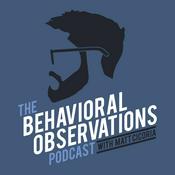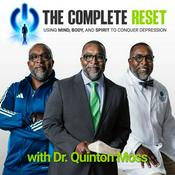The Behavioral Observations Podcast with Matt Cicoria
Matt Cicoria

Latest episode
327 episodes
Developing Rapport and Sustaining Motivation in Autism Treatment: Session 325 with Alice Shillingsburg
2/23/2026 | 1h 5 mins.In this episode, I talk with Dr. Alice Shillingsburg about her work on rapport building and pairing procedures in applied behavior analysis for children with autism. We explore how building therapeutic rapport goes beyond simply "liking someone," emphasizing the importance of establishing trust and engagement to facilitate learning, especially when tasks are challenging.
Alice explains the nine-stage pairing protocol she developed and highlights how careful timing, observation, and reinforcement choices can make pairing effective. We discuss the significance of observing children's approach behaviors to understand their preferences and keep therapy engaging, as well as how instructional fading can gradually increase task difficulty without creating aversive experiences.
During our conversation, we took a quick sidebar to talk about the upcoming Verbal Behavior Conference. This is a conference like none other. Whether you participate online or make the short drive to Austin, you'll be treated to very in-depth talks about generative learning for individuals with Autism and related disabilities. Learn more and register here.
We also dive into practical applications — how pairing and instructional procedures can be adapted in real-world therapy settings, while still maintaining their effectiveness. Alice talks about data collection strategies for engagement and behavior, including the importance of tracking approach behaviors, avoidance, and other signals of a child's readiness.
Finally, we consider the sustainability of pairing procedures over time and potential directions for future research, including investigating methods of instructional fading and tracking gestural communication development in children with autism.
Resources Mentioned
Shillingsburg, et al. (2019). Rapport Building and Instructional Fading Prior to Discrete Trial Instruction: Moving From Child-Led Play to Intensive Teaching
Cariveau, et al. (2020). A Structured Intervention to Increase Response Allocation to Instructional Settings for Children with Autism Spectrum Disorder
Shillingsburg, et al. (2014). Increasing social approach and decreasing social avoidance in children with autism spectrum disorder during discrete trial training
Sponsor Shoutouts
The School Behavioral Solutions for Special Educators & Behavior Analysts. The Behavior Toolbox Conference is a one-day, high-impact professional convening that brings together experienced practitioners and leaders from across education and behavior science to share what actually works in schools. It's taking place virtually through BehaviorLive on March 5th, 2026, and will be available on-demand for those who can't make it on the day of the event.
CEUs from Behavioral Observations. Learn from your favorite podcast guests while you're commuting, walking the dog, or whatever else you do while listening to podcasts. New events are being added all the time, so check them out here.
The 2026 Verbal Behavior Conference! Taking place March 26–27, 2026, in Austin, Texas, or livestream and on-demand on BehaviorLive. Presenters will include Drs. Mark Sundberg, Patrick McGreevy, Caio Miguel, Alice Shillingsburg, Sarah Frampton, Andresa De Souza, and Danielle LaFrance will share how Skinner's analysis of verbal behavior can guide the assessment and treatment of generative learning challenges in children with autism and other developmental disabilities. And don't miss the special pre-conference workshop on Wednesday, March 25.Resilience Is a Skill — Raising Capable Kids in a Fragile World: Session 324 with Paulie Gavoni and Steve Ward
2/13/2026 | 1h 21 mins.In Session 324, Dr. Paulie Gavoni and Steve Ward join me to discuss what resilience actually looks like from a behavior science perspective — and why many well-intentioned adult responses can unintentionally teach avoidance instead of persistence.
We center our conversation around their book, S.H.I.T. Happens: Building Resilient Children in a Fragile World, which reframes resilience not as a personality trait or motivational slogan, but as a set of learnable repertoires shaped by the environments adults design
We talk about:
Why resilience is a behavioral repertoire, not a mindset or personality trait
The hidden ways adult anxiety shapes children's learning environments
How overprotection and pressure both undermine skill development
Designing "successful struggle" so kids contact reinforcement for effort
Everyday moments — homework, sports, emotional setbacks — as resilience practice
The adult's role as guide, not rescuer or drill sergeant
Teaching recovery instead of avoidance
Scaling challenges to build confidence and persistence
Why discomfort is information, not danger
This discussion emphasizes practical decision-making: how small changes in adult behavior can create conditions where children learn to try again, persist longer, and experience the satisfaction of overcoming something difficult.
Whether you're a practitioner, educator, or parent, this episode highlights how resilience is built through repeated opportunities to struggle safely — and why those opportunities matter more than we often realize.
Resources mentioned:
Paulie and Steve's book
Assent & Trauma Informed Care: A Call for Nuance in Behavior Analysis
Motivational Interviewing: Getting Educator Buy-In (course)
Adaptive Intelligence: The Evolution of Emotional Intelligence Through the Proven Power of Behavior Science
Paulie's other books
Kind Extinction: A Procedural Variation on Traditional Extinction
The Four Leadership Hats: Applying Behavioral Science to Leadership and Supervision (Session 321 with John Guercio)
The ACT Matrix: A New Approach to Building Psychological Flexibility Across Settings and Population
Session 313: Client Assent in Behavior Analysis: Balancing Autonomy and Clinical Progress (Ethics CE available)
Sponsor shoutouts
The School Behavioral Solutions for Special Educators & Behavior Analysts. The Behavior Toolbox Conference is a one-day, high-impact professional convening that brings together experienced practitioners and leaders from across education and behavior science to share what actually works in schools. It's taking place virtually through BehaviorLive on March 5th, 2026, and will be available on-demand for those who can't make it on the day of the event.
Behavior University. Their mission is to provide university quality professional development for the busy Behavior Analyst. Learn about their CEU offerings, including their 8-hour Supervision Course, as well as their RBT offerings over at behavioruniversity.com/observations. Don't forget to use the coupon code, PODCAST to save at checkout!
CEUs from Behavioral Observations. Learn from your favorite podcast guests while you're commuting, walking the dog, or whatever else you do while listening to podcasts. New events are being added all the time, so check them out here.
HRIC Recruting. Cut out the middleman and speak directly with Barbara Voss, who's been placing BCBAs in great jobs all across the US for 15 years.Building Clinical Excellence in Autism Services: How Apollo Trains and Supports RBTs and BCBAs - Session 322
1/30/2026 | 1h 1 mins.In this episode of the Behavioral Observations Podcast, I'm joined by Kim Dean, founder of Apollo Behavior, and Kristen Vaughn, Vice President of Clinical Operations, to talk about what it really takes to build and sustain clinical excellence in autism services.
We discuss Apollo's decision to launch in Georgia, their highly selective hiring process, and how values alignment plays a central role in building their culture. Kim and Kristen share how Apollo approaches training differently — including a four-week RBT onboarding program that exceeds certification requirements and a structured mentorship model for BCBAs.
The results are notable, with 99% of Apollo's RBTs passing their exams on the first attempt! Even more impressive is that 84% of Apollo-trained BCBAs pass their exam on the first attempt too. Compared to the current average pass rate that hovers around 52-54%, that's simply amazing!
We also dig into how Apollo defines and measures clinical excellence, including the use of norm-referenced assessments, family feedback, progress toward less restrictive environments, and ongoing data analysis to improve training and service delivery.
This conversation is especially relevant for BCBAs, clinical leaders, and practice owners who are thinking seriously about how to scale services without sacrificing quality — and how to design systems that support clinicians, families, and long-term outcomes.
If this sounds like a great work environment to you, and you'd like to learn more, click here.
Related BOP Episodes:
From Clinician to Leader: Apollo CSS 8 with Kristen Vaughn
All previous Apollo Series BOP episodes
This podcast is brought to you by:
The School Behavioral Solutions for Special Educators & Behavior Analysts. The Behavior Toolbox Conference is a one-day, high-impact professional convening that brings together experienced practitioners and leaders from across education and behavior science to share what actually works in schools. Rather than relying on theory divorced from practice, this conference features presenters who actively operate within classrooms, districts, research settings, and state-level systems. Behavior analysts, educators, researchers, and system leaders come together to examine behavior change from multiple levels of impact — adult behavior, decision-making, values, and the systems that shape outcomes. It's taking place virtually through BehaviorLive on March 5th, 2026, and will be available on-demand for those who can't make it on the day of the event.
Office Puzzle: A thriving ABA practice depends on systems that actually support your team, not slow them down. If you've struggled with software that's buggy, hard to navigate, or offers little support when you need it most, you're not alone. That's why so many practices are switching to Office Puzzle. Go to officepuzzle.com/bop to learn more!
The 2026 Verbal Behavior Conference! Taking place March 26–27, 2026, in Austin, Texas, or livestream and on-demand on BehaviorLive. Presenters will include Drs. Mark Sundberg, Patrick McGreevy, Caio Miguel, Alice Shillingsburg, Sarah Frampton, Andresa De Souza, and Danielle LaFrance will share how Skinner's analysis of verbal behavior can guide the assessment and treatment of generative learning challenges in children with autism and other developmental disabilities. And don't miss the special pre-conference workshop on Wednesday, March 25.
CEUs from Behavioral Observations. Learn from your favorite podcast guests while you're commuting, walking the dog, or whatever else you do while listening to podcasts. New events are being added all the time, so check them out here.- En este episodio, Miguel conversa con María Sánchez, una profesional con un impacto notable en la formación de analistas de conducta en España y Latinoamérica. La charla gira en torno al Behavioral Skills Training (BST) o Entrenamiento de Habilidades Conductuales: qué es, cómo se aplica en la práctica y por qué sigue siendo una de las herramientas más efectivas para entrenar tanto a profesionales como a familias.
María comparte su recorrido profesional, que comienza en Inglaterra en un centro para niños con autismo y evoluciona hacia su trabajo en PECS, donde encontró su vocación inesperada en la supervisión y formación de otros profesionales. Trabajó en la capacitación de profesionales en Argentina, Uruguay, Chile, Costa Rica y España, observando de primera mano el poder transformador de la comunicación aumentativa, especialmente en niños no verbales que comienzan a desarrollar estructuras de lenguaje más complejas.
Durante la pandemia, y tras el cierre inicial en Italia, María reinventó su práctica y creó 360 Online, un proyecto de formación remota para garantizar que profesionales en regiones aisladas pudieran acceder a entrenamientos RBT e IBT de calidad. Desde entonces, ha formado a cientos de estudiantes a través de clases sincrónicas, colaboraciones con centros en Latinoamérica y sesiones a distancia altamente prácticas.
Miguel y María profundizan en el procedimiento BST —instrucciones, modelado, juego de roles y retroalimentación—, explorando cómo implementarlo eficazmente con adultos, cómo dar feedback específico sin sobrecargar, y cómo equilibrar correcciones con reconocimiento positivo. También dialogan sobre las ventajas y desafíos de entrenar a distancia, la importancia ética de proteger la privacidad de clientes y familias, la necesidad de fomentar ambientes de aprendizaje seguros y empoderadores, el rol del telehealth en la generalización de habilidades y las demandas formativas reales en España y Latinoamérica, donde muchos profesionales tienen apenas una o dos horas semanales para cumplir con las 40 horas requeridas.
Antes de cerrar, María ofrece consejos esenciales para quienes están en el campo del análisis de conducta, subrayando la importancia del trabajo en equipo, la práctica deliberada y la humildad profesional.
BOP in English: BST with María Sánchez
In this episode, Miguel speaks with María Sánchez, a professional with a remarkable impact on the training of behavior analysts across Spain and Latin America. The conversation centers on Behavioral Skills Training (BST)—what it is, how it is applied in practice, and why it remains one of the most effective tools for training both professionals and families.
María shares her professional journey, which began in England at a center for children with autism and later led her to her work with PECS, where she unexpectedly discovered her passion for supervision and professional training. She provided training to professionals in Argentina, Uruguay, Chile, Costa Rica, and Spain, witnessing firsthand the transformative power of augmentative communication, especially in nonverbal children who begin developing more complex language structures.
During the pandemic—and after the initial shutdown in Italy—María reinvented her practice and created 360 Online, a remote training project designed to ensure that professionals in isolated regions could access high-quality RBT and IBT training. Since then, she has trained hundreds of students through synchronous classes, collaborations with centers across Latin America, and highly practical remote sessions.
Miguel and María dive into the *BST procedure—instructions, modeling, role play, and feedback—*discussing how to implement it effectively with adults, how to provide specific feedback without overwhelming, and how to balance corrections with positive reinforcement. They also explore the advantages and challenges of remote training, the ethical importance of protecting client and family privacy, the need to foster safe and empowering learning environments, the role of telehealth in skill generalization, and the training demands faced in Spain and Latin America, where many practitioners have only one or two hours per week to complete the required 40 hours.
Before wrapping up, María shares essential advice for those in the field of behavior analysis, emphasizing teamwork, deliberate practice, and professional humility. The Four Leadership Hats: Applying Behavioral Science to Leadership and Supervision — Session 321 with John Guercio
1/15/2026 | 1h 30 mins.In this episode, I'm joined by John Guercio for a wide-ranging and practical conversation about leadership through a behavioral lens. John and I dig into what it actually means to lead in applied behavior analysis, especially when so much of the existing leadership literature is vague, mentalistic, or disconnected from observable behavior.
We start by talking about the need to operationalize leadership in behavioral terms and explore the four leadership hats developed by Dr. Paulie Gavoni: leading, training, coaching, and managing. We break down what each of these roles looks like behaviorally, how they function across time, and why effective leaders need to move flexibly between them rather than relying on a single style.
A major theme of the episode is the role of positive reinforcement in leadership. John shares real-world examples from his OBM coursework and his work at Cornerstone Behavioral Services, highlighting how difficult—but necessary—it can be to shift away from punitive and avoidance-based management strategies. We discuss why punishment often "works" in the short term, why leaders continue to rely on it, and how reinforcement-based leadership creates better outcomes for both staff and organizations.
We also spend time unpacking the distinction between leadership and management. John reflects on his own strengths and limitations, describing how he focuses on vision and direction while intentionally surrounding himself with strong managers who excel at systems, logistics, and follow-through. This leads to a powerful discussion about positional authority, seniority, and the myth that leadership status entitles people to treat others poorly.
Throughout the episode, we return to the importance of psychological safety, consistent feedback, and emotional regulation in leadership roles. John shares practical strategies for navigating tough conversations, including how to balance empathy with accountability, how to manage staff expectations, and how to avoid letting emotion drive professional communication (including when not to send that email).
We also talk through concrete tools and exercises for improving leadership practice, such as symbolic problem-solving activities to surface unspoken team issues, written acknowledgment systems, and using assessment tools like the Performance Diagnostic Checklist to guide supervision and coaching. John closes by sharing future directions for developing empirically grounded management assessment tools, along with a preview of his upcoming work and conference presentations.
This is a practical, honest conversation for anyone supervising staff, leading teams, or trying to build reinforcing, values-consistent organizations in human services.
Resources & Links Mentioned in This Episode
RBT Course for Adult Services (the 'bridge' course too!)
Sims and Szilagyi (1975). Leader reward behavior and subordinate satisfaction and performance
Stone Soup Conference Registration (use code PODCAST26 at checkout)
Carr and Wilder (2015). The Performance Diagnostic Checklist—Human Services
John's previous BOP appearances
Session 274: Psychological Safety in the Workplace (Supervision CEU!)
Additional Books, Articles, and Ideas Discussed
John's books on Amazon
Komaki (1998). Leadership from an Operant Perspective
McGregor (1960). The Human Side of Enterprise
Daniels and Daniels (2023). The Measure of a Leader
Elliot (2012). Leading Apple With Steve Jobs: Management Lessons From a Controversial Genius
Covey (2020). The 7 Habits of Highly Effective People, 30th Anniversary Edition
Harley (2013). How to Say Anything to Anyone
Grenny et al. (2021). Crucial Conversations (Third Edition): Tools for Talking When Stakes Are High
Sponsor shoutouts!
Office Puzzle: A thriving ABA practice depends on systems that actually support your team, not slow them down. If you've struggled with software that's buggy, hard to navigate, or offers little support when you need it most, you're not alone. That's why so many practices are switching to Office Puzzle. Go to officepuzzle.com/bop to learn more!
HRIC Recruting. Cut out the middleman and speak directly with Barbara Voss, who's been placing BCBAs in great jobs all across the US for 15 years.
The 2026 Stone Soup Conference! This is one of the best values in the online conference space. I'm actually going to be one of the speakers at this year's event, along with a great cast of other characters you're probably familiar with. Save on your registration by using promo code PODCAST26
Behavior University. Their mission is to provide university quality professional development for the busy Behavior Analyst. Learn about their CEU offerings, including their 8-hour Supervision Course, as well as their RBT offerings over at behavioruniversity.com/observations. Don't forget to use the coupon code, PODCAST to save at checkout!
The 2026 Verbal Behavior Conference! Taking place March 26–27, 2026, in Austin, Texas, or livestream and on-demand on BehaviorLive. Presenters will include Drs. Mark Sundberg, Patrick McGreevy, Caio Miguel, Alice Shillingsburg, Sarah Frampton, Andresa De Souza, and Danielle LaFrance will share how Skinner's analysis of verbal behavior can guide the assessment and treatment of generative learning challenges in children with autism and other developmental disabilities. And don't miss the special pre-conference workshop on Wednesday, March 25.
CEUs from Behavioral Observations. Learn from your favorite podcast guests while you're commuting, walking the dog, or whatever else you do while listening to podcasts. New events are being added all the time, so check them out here.
More Health & Wellness podcasts
Trending Health & Wellness podcasts
About The Behavioral Observations Podcast with Matt Cicoria
The Behavioral Observations Podcast with Matt Cicoria is an interview-based show that features conversations with innovative scientists and practitioners in the field of Behavior Analysis. The podcast covers topics such as Autism, Functional Behavioral Assessment, Acceptance and Commitment Therapy, Functional Communication Training, Verbal Behavior, and more!
Podcast websiteListen to The Behavioral Observations Podcast with Matt Cicoria, The Dylan Gemelli Podcast and many other podcasts from around the world with the radio.net app

Get the free radio.net app
- Stations and podcasts to bookmark
- Stream via Wi-Fi or Bluetooth
- Supports Carplay & Android Auto
- Many other app features
Get the free radio.net app
- Stations and podcasts to bookmark
- Stream via Wi-Fi or Bluetooth
- Supports Carplay & Android Auto
- Many other app features


The Behavioral Observations Podcast with Matt Cicoria
Scan code,
download the app,
start listening.
download the app,
start listening.








































